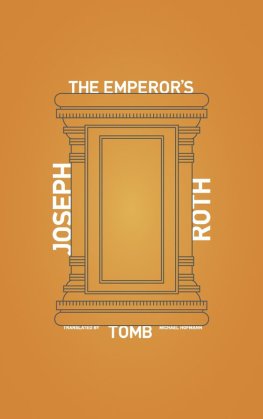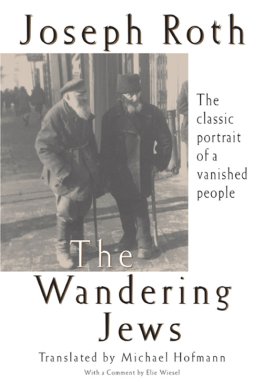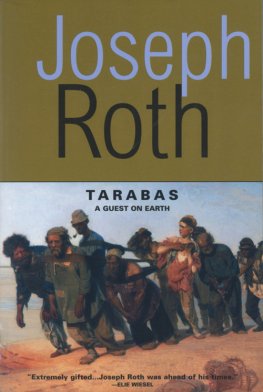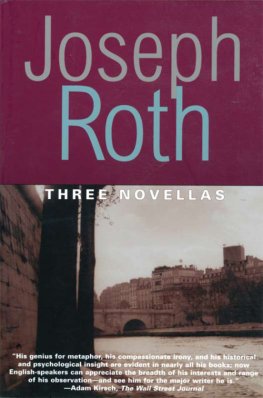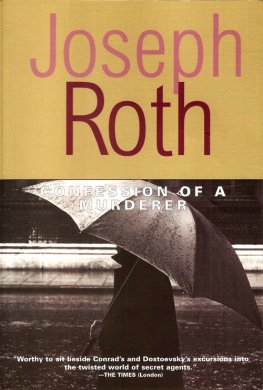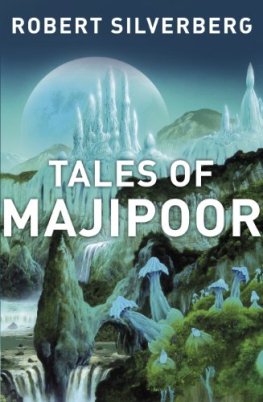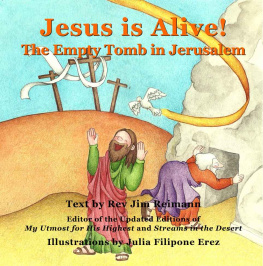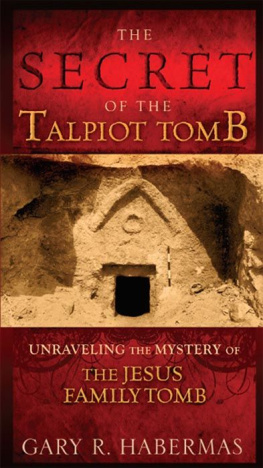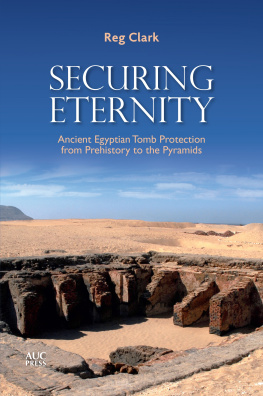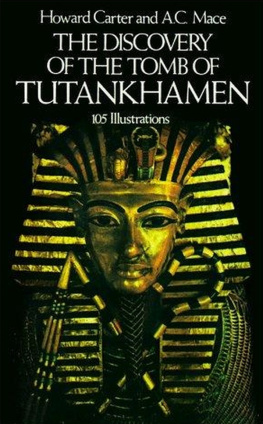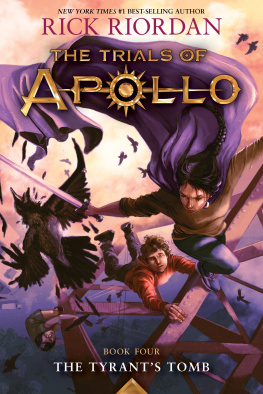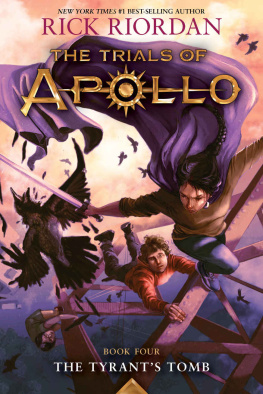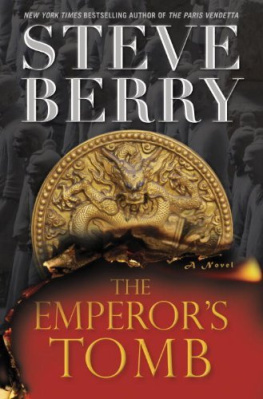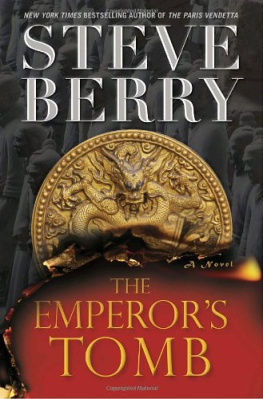Joseph Roth - The Emperor's Tomb
Here you can read online Joseph Roth - The Emperor's Tomb full text of the book (entire story) in english for free. Download pdf and epub, get meaning, cover and reviews about this ebook. year: 2013, publisher: New Directions, genre: Prose. Description of the work, (preface) as well as reviews are available. Best literature library LitArk.com created for fans of good reading and offers a wide selection of genres:
Romance novel
Science fiction
Adventure
Detective
Science
History
Home and family
Prose
Art
Politics
Computer
Non-fiction
Religion
Business
Children
Humor
Choose a favorite category and find really read worthwhile books. Enjoy immersion in the world of imagination, feel the emotions of the characters or learn something new for yourself, make an fascinating discovery.
- Book:The Emperor's Tomb
- Author:
- Publisher:New Directions
- Genre:
- Year:2013
- Rating:4 / 5
- Favourites:Add to favourites
- Your mark:
- 80
- 1
- 2
- 3
- 4
- 5
The Emperor's Tomb: summary, description and annotation
We offer to read an annotation, description, summary or preface (depends on what the author of the book "The Emperor's Tomb" wrote himself). If you haven't found the necessary information about the book — write in the comments, we will try to find it.
The Emperor's Tomb — read online for free the complete book (whole text) full work
Below is the text of the book, divided by pages. System saving the place of the last page read, allows you to conveniently read the book "The Emperor's Tomb" online for free, without having to search again every time where you left off. Put a bookmark, and you can go to the page where you finished reading at any time.
Font size:
Interval:
Bookmark:
Joseph Roth
The Emperor's Tomb
Translators Introduction
The homeland, the myth of the homeland, becomes a fundamental value for those who have nothing else.
Andrzej Stasiuk, FadoWe cannot go there now, my dear, we cannot go there now.
W. H. Auden, Refugee BluesThe Emperors Tomb in German Die Kapuzinergruft, The Crypt of the Capuchins (the eerie underground burial place of the Habsburgs on the Neuer Markt in the middle of Vienna), and before that variously The Cup of Life and A Man Seeks His Fatherland was the last novel Joseph Roth wrote, and the last he actually saw in print, in December 1938 or January 1939. The String of Pearls was published after his death in May 1939, but was written rather earlier, in 1935 and 1936, only to be overtaken in Roths gruelling and chaotic final years by this more political and more commercially promising and up-to-the-minute sequel to Roths most successful novel, The Radetzky March of 1932. Both were published (in German) by the tiny Dutch Catholic press, de Gemeenschap, of Bilthoven, Roth having exhausted the few other, more conventional migr possibilities through a combination of need, under-payment, market-saturation and all-round prickliness.
As a sequel, it is a study in complementarity, but also in contrasts. It is a novel of mothers and marriages where The Radetzky March is strictly patrilineal. The Radetzky March begins and ends with scenes of battle (Solferino and Krasne-Busk), The Emperors Tomb runs from the eve of one war to the eve of the next, from 1913 to 1938. Where The Radetzky March uniquely in Roths fiction impresses with its orchestration, its stateliness, its pageantry, the glorious Tolstoyan fullness of its realization (done in oils, is how I described it), The Emperors Tomb the cartoon after the finished painting seems to revert to Roths Zeitungsroman mode of the twenties, scribbled, spur of the moment, skittish, distrait: the numerous short chapters, the insistent tugging at the narrative (So, in the middle of the summer of 1914, I went to Zlotogrod), the continual introduction of new characters and locations and abrupt twists and jags in the plot. While the composition of The Radetzky March recalls broad discs overhanging one another, like the records cued on an old-fashioned gramophone, The Emperors Tomb colourful, bitty and intense is more like a shaken kaleidoscope of tumbled glass shards. The Radetzky March is wine, The Emperors Tomb in Yeatss word wine-breath.
The Radetzky March conveys a whole gone world; The Emperors Tomb is more a canny valedictory repertoire of Rothian tropes and characters, done fast, glancingly and sometimes approximately: the spoiled, rather foolish youth; the return to the army; falling in and out of love; male friendships often across gulfs of class, geography and language; the frontier bar; being taken prisoner in the East; the Heimkehrer of 1918, who becomes a superfluous man unable to settle into the altered postwar world; a jaundiced view of contemporary design and morals; the centre and the fringes of empire; the operation of treachery and infidelity and economic ruin; the heros final isolation in space, time and feeling. While The Radetzky March can seem like a fabulous concatenation of anthology-ripe scenes never bettered anywhere seduction, death, duel, feast, drinking, roulette, manoeuvres, battle, you name it everything in The Emperors Tomb seems to have come from somewhere else in Roth, where it was usually handled with greater expansiveness and willingness. There is something astringent and shorthand and weathered about it. It is a slight return, like the wheel of a sestina, or the satyr play concluding a Classical trilogy. It is like one of Elisabeths blueprints for an unrealized design; a teasing combination of menu and confit (in contrast to the opulent multi-course meal that is Radetzky). It is laconic and mannerly; spare and drenched in a desperate intensity of feeling; detailed when it wants to be, rapid and fast-forward when it doesnt. (As a measure of this, Roth promised his publishers with him one almost always wants to say, his poor publishers a manuscript of 350 pages, but actually delivered just 173.) Where The Radetzky March is third person and epic, The Emperors Tomb (though it began in third person) is in a slightly problematical first person. It is not so much a direct sequel, as a sort of round-the-corner continuation, with its three separate moorings: its Trotta is the second cousin of the hero of The Radetzky March; its Chojnicki a brother of the wise and far-seeing alchemist count who ends up in the asylum at Steinhof; Onufri and Kapturak are wheeled on again, and its Jacques is a mystical double or perhaps reprise of the original servant character.
Where Austria in The Radetzky March is to some extent accidental it is a great novel about anywhere The Emperors Tomb is deliberately and unmistakably a book about the Austria of those years, couched between symbol and allegory (what price the lesbian relationship between Elisabeth and Jolanth as a scurrilous reflection of the Dual Monarchy of Austria and Hungary?). It is indeed, as Paul Keegan once put it to me, a non-fiction novel, whose characters and action are shaped, if not supplied, by the bigger action of history in those years: sleepwalking into war, defeat, revolution, inflation, confusion of classes (old and new money), Depression, reaction. Most of the characters are weak, but in any case, character is no refuge against such history, any more than a piece of seaweed is against a tide. No one can oppose these developments, no one: not the brilliant violinist Ephraim who gives up his violin for Communist politics and a police bullet; not Elisabeth who goes to Hollywood, nor her father whose brilliant time as a war-profiteer is followed by years of failed and instinctless speculations; not the army bureaucrat Stellmacher, who winds up as an information office on the whereabouts of mostly dead officers; not Joseph Branco whose chestnut-selling tours of the Dual Monarchy are abruptly curtailed by new frontiers; not Frau Trotta who takes refuge in deafness and infirmity, so as not to feel her personal Anschluss by the appalling Prussian vulgarian von Stettenheim; and least of all Franz Ferdinand Trotta, awed by his mother but shaped by his father, who does everything that is asked of him, and still winds up alone and in despair. It is no accident that the hero climbs down into the tomb of the Habsburgs, because, in truth, where else is there for him for Roth to go in 1938, after the annexation and incorporation of Austria into Hitlers German Reich of March of that year? When the Brownshirt walks into the caf at the end to make his pompous announcement, Trotta in his lordly confusion thinks he must have come up out of the toilets, even though part of him knows the toilets are actually elsewhere. Then he thinks the whole world must have been turned upside down, which makes the final descent into the tomb an act of self-preservation as much as one of self-sepulture.
The Emperors Tomb is a strange, wonderful, drastic and unconsoling book. Like Flight Without End of 1927, the novel of Roths it most resembles, it plunges through a world and a lifetime as through a vacuum. The finishing line comes up way before we were ready for it and weve lost. Was that everything, hero and reader think, in both cases, looking up in startled unison. Well, yes. The haunting final scene of Roths earlier Flight Without End goes in David Le Vays translation:
It was at this hour that my friend Tunda, thirty-two years of age, healthy and vigorous, a strong young man of diverse talents, stood on the Place de la Madeleine, in the centre of the capital of the world, without any idea what to do. He had no occupation, no desire, no hope, no ambition, and not even any self-love. No one in the whole world was as superfluous as he.
Font size:
Interval:
Bookmark:
Similar books «The Emperor's Tomb»
Look at similar books to The Emperor's Tomb. We have selected literature similar in name and meaning in the hope of providing readers with more options to find new, interesting, not yet read works.
Discussion, reviews of the book The Emperor's Tomb and just readers' own opinions. Leave your comments, write what you think about the work, its meaning or the main characters. Specify what exactly you liked and what you didn't like, and why you think so.

